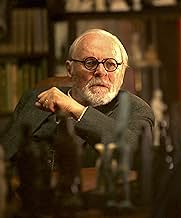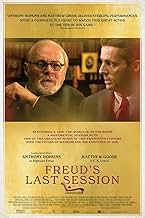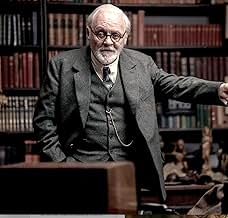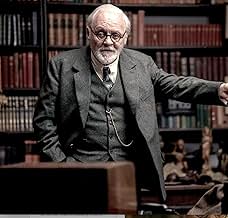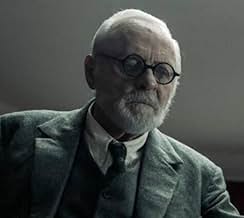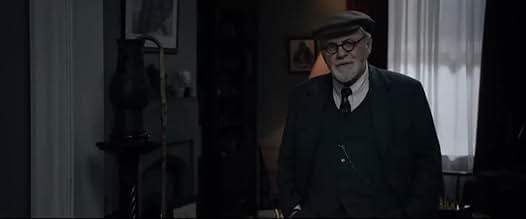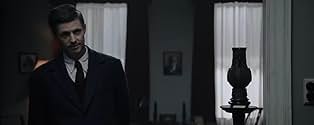PUNTUACIÓN EN IMDb
6,1/10
7,1 mil
TU PUNTUACIÓN
Freud invita al emblemático escritor C.S. Lewis a debatir sobre la existencia de Dios. Y la relación poco convencional de Lewis con la madre de su mejor amigo.Freud invita al emblemático escritor C.S. Lewis a debatir sobre la existencia de Dios. Y la relación poco convencional de Lewis con la madre de su mejor amigo.Freud invita al emblemático escritor C.S. Lewis a debatir sobre la existencia de Dios. Y la relación poco convencional de Lewis con la madre de su mejor amigo.
- Dirección
- Guión
- Reparto principal
- Premios
- 1 nominación en total
George Andrew-Clarke
- Paddy Moore
- (as George Clarke)
Anna Amalie Blomeyer
- Ilsa
- (as Anna Blomeyer)
Reseñas destacadas
It's a contrast-intellectual-perspectives-on-God drama set on September 3, 1939, in London, England at the home of 83-year-old Sigmund Freud (Anthony Hopkins), and his daughter, Anna (Liv Lisa Fries). The Freuds had fled Vienna, Austria in 1938 after Anna had been briefly detained. Freud was severely suffering from oral cancer and taking a lot of morphine at the date in question. Freud did not believe in God, despite early training in both Catholicism and Judaism.
Freud's last intellectual visitor in this fictional account is C. S. Lewis (Matthew Goode), a 45-year-old Oxford don, and Christian apologist after rediscovering faith in the early 1930s.
The film follows the conversation between Freud and Lewis, with various flashbacks at key including Freud's youth and Lewis's experiences in World War I. The film also touches on Anna's relationship to her father and to Dorothy Burlingham (Jodi Balfour), a former patient of Sigmund's and close friend of Anna. The film also notes Lewis's conversion and his unusual relationship with Janie Moore (Orla Brady), the mother of Lewis's wartime comrade, Paddy Moore (George Andrew-Clarke).
"Freud's Last Session" has Freud and Lewis punch holes in their opponent's perspectives on God, with neither landing a knock-out. The flashbacks and inserts related to Anna provide some breaks. Hopkins and Goode are excellent while burdened with what felt like a pretty flat script. It was a kind of gamesmanship without much direction.
Freud's last intellectual visitor in this fictional account is C. S. Lewis (Matthew Goode), a 45-year-old Oxford don, and Christian apologist after rediscovering faith in the early 1930s.
The film follows the conversation between Freud and Lewis, with various flashbacks at key including Freud's youth and Lewis's experiences in World War I. The film also touches on Anna's relationship to her father and to Dorothy Burlingham (Jodi Balfour), a former patient of Sigmund's and close friend of Anna. The film also notes Lewis's conversion and his unusual relationship with Janie Moore (Orla Brady), the mother of Lewis's wartime comrade, Paddy Moore (George Andrew-Clarke).
"Freud's Last Session" has Freud and Lewis punch holes in their opponent's perspectives on God, with neither landing a knock-out. The flashbacks and inserts related to Anna provide some breaks. Hopkins and Goode are excellent while burdened with what felt like a pretty flat script. It was a kind of gamesmanship without much direction.
I saw this movie this afternoon - Saturday afternoon - and there were only three people in the hall. I was not surprised.
Freud's Last Session is part of a cottage movie genre, almost always taken from a Broadway play, where two-man shows are relatively common. The author puts two historical figures together in a room and lets them debate various important issues for close to two hours. Nixon/Frost is the one I remember offhand, but there have been others as well. In the theater - a small theater - I can see this working well. I'm not sure how it works as a movie, or more to the point: for whom it works. Movies, even modest ones like this, cost a LOT more to produce than plays. Can something like this recoup the investment?
Yes, the two actors give very fine performances. People go to see Shakespeare plays not to see what will happen to Hamlet or Romeo and Juliet. They already know before they enter the theater. They go to see how the actors will deliver the lines.
But here, unlike in Shakespeare, the lines are not particularly striking. Hopkins in particular did a great job of creating the character Freud, but he didn't have Shakespeare's words - or even, say, those of the playwright who wrote The Lion in Winter - to work with.
So I'm left with my initial question: how many people are going to pay to see Hopkins and Goode deliver their uninspired lines? And will that make enough ticket sales to at least break even on this movie?
I enjoyed it, yes, but I found that it was too much of the same thing for too long, and would have been happier if it had been shorter.
Freud's Last Session is part of a cottage movie genre, almost always taken from a Broadway play, where two-man shows are relatively common. The author puts two historical figures together in a room and lets them debate various important issues for close to two hours. Nixon/Frost is the one I remember offhand, but there have been others as well. In the theater - a small theater - I can see this working well. I'm not sure how it works as a movie, or more to the point: for whom it works. Movies, even modest ones like this, cost a LOT more to produce than plays. Can something like this recoup the investment?
Yes, the two actors give very fine performances. People go to see Shakespeare plays not to see what will happen to Hamlet or Romeo and Juliet. They already know before they enter the theater. They go to see how the actors will deliver the lines.
But here, unlike in Shakespeare, the lines are not particularly striking. Hopkins in particular did a great job of creating the character Freud, but he didn't have Shakespeare's words - or even, say, those of the playwright who wrote The Lion in Winter - to work with.
So I'm left with my initial question: how many people are going to pay to see Hopkins and Goode deliver their uninspired lines? And will that make enough ticket sales to at least break even on this movie?
I enjoyed it, yes, but I found that it was too much of the same thing for too long, and would have been happier if it had been shorter.
I respect S Freud as an early but pioneering psychologist, and I very much admire C. S. Lewis as a humanist and fiction writer. Whether this meeting between Freud and Lewis really happened doesn't matter so much, I think. What matters is that it's a fascinating concept to imagine the two men debating science vs religion, and this film does a very decent job of portraying this discussion.
While I wouldn't go so far as to call this the most moving film I've ever seen - I think Shadowlands for example was far more moving and The Soul Keeper ( a film about Jung and his female patient ) was more intriguing - I did genuinely find Freud's Last Session to be philosophically poignant. The discussions between Freud and Lewis are intellectually sound and do ask those age old questions, such as if God is good, why is there suffering? A question I guess we all grapple with in one way or another.
This film did remind me a bit of In Lambeth the other play about a fictional meeting between Thomas Paine and William Blake which, while quite different, approached the two sides of a philosophical debate in a similarly genuine and interesting manner.
Ultimately, there is quite a good amount of wisdom and intellectual content in Freud's Last Session and for that I found it fun, mildly moving and worthwhile. The cinematography and acting are decent. If you like psychology, philosophy and films that are really just play's on screen, then I hope you'll enjoy this.
While I wouldn't go so far as to call this the most moving film I've ever seen - I think Shadowlands for example was far more moving and The Soul Keeper ( a film about Jung and his female patient ) was more intriguing - I did genuinely find Freud's Last Session to be philosophically poignant. The discussions between Freud and Lewis are intellectually sound and do ask those age old questions, such as if God is good, why is there suffering? A question I guess we all grapple with in one way or another.
This film did remind me a bit of In Lambeth the other play about a fictional meeting between Thomas Paine and William Blake which, while quite different, approached the two sides of a philosophical debate in a similarly genuine and interesting manner.
Ultimately, there is quite a good amount of wisdom and intellectual content in Freud's Last Session and for that I found it fun, mildly moving and worthwhile. The cinematography and acting are decent. If you like psychology, philosophy and films that are really just play's on screen, then I hope you'll enjoy this.
It's 1939 on the very eve of declaration of War in London. Oxford don C. S. Lewis (Matthew Goode) calls upon Sigmund Freud (Anthony Hopkins) at his invitation. He passes Anna Freud (Liv Lisa Fries) as she goes out to lecture and ponder whether she will reveal her lesbian affair to her father. Meanwhile, the two men attack each other's philosophical beliefs.
And that's what the movie is, two men talking, interrupted occasionally by flashbacks to their younger days and air raid to lend this stage play some cinematic credibility. In this made-up scenario -- although the story is that an Oxford don visited Freud shortly before his death, the claim, as here, that it was Lewis, is a fabrication of the play and movie -- they argue around each other, and finally agree only that people are afraid of death.
The rest of it.... well, Freud's beliefs are at the end of his life (he died three weeks after the supposed events of this film), while there are plenty of things that Lewis did say until twenty years after. As for the basic disagreement about religion versus science, that's a non-conflict; as smarter people than I have declared, science is about how, not why. If G*d created the universe we live in, thanks a lot.
Both men are fine actors and easily translate the script into natural-sounding words. I have no idea if Hopkins' accent is a good representation of the Viennese one; Kohli Calhoun is listed as the dialect coach.
And that's what the movie is, two men talking, interrupted occasionally by flashbacks to their younger days and air raid to lend this stage play some cinematic credibility. In this made-up scenario -- although the story is that an Oxford don visited Freud shortly before his death, the claim, as here, that it was Lewis, is a fabrication of the play and movie -- they argue around each other, and finally agree only that people are afraid of death.
The rest of it.... well, Freud's beliefs are at the end of his life (he died three weeks after the supposed events of this film), while there are plenty of things that Lewis did say until twenty years after. As for the basic disagreement about religion versus science, that's a non-conflict; as smarter people than I have declared, science is about how, not why. If G*d created the universe we live in, thanks a lot.
Both men are fine actors and easily translate the script into natural-sounding words. I have no idea if Hopkins' accent is a good representation of the Viennese one; Kohli Calhoun is listed as the dialect coach.
The script is thought provoking as you follow a neurologist who discovered psychoanalysis conversing with a Christian author who wrote The Chronicles of Narnia. ALSO, the events take place on the day before WWII and both gentlemen are equally brilliant as they are stubborn, as seen with each of the many discussions-turned-arguments that take place. Transitions and flashbacks are heavily utilized to portray character depth, but whether it's a particular style of acting or the timing of each scene paired together, this format ultimately doesn't work. Anthony Hopkins and Matthew Goode showcase their individual acting talent with long monologues and fluctuating emotions, but in the pivotal moments of occupying a scene together, the chemistry never quite flourishes. However, director Matt Brown keeps the viewer engaged by allowing us to be an unbiased fly on the wall rather than purposely tilting the conversation in one direction. The story feels restrained, most likely due to the subject matter, but that won't affect the enjoyable experience that many will have.
¿Sabías que...?
- CuriosidadesAnthony Hopkins had previously portrayed C.S. Lewis in Tierras de penumbra (1993) 30 years prior to this film.
- PifiasLewis refers to JRR Tolkien as "John". He was known as "Ronald" to his friends.
- Citas
J.R.R. Tolkien: Jack, when you read myths about gods that come to Earth and sacrifice themselves, their stories move you, so long as you read it anywhere but the Bible.
- ConexionesFeatured in The 7PM Project: Episodio fechado 19 abril 2024 (2024)
- Banda sonoraVariations on an Original Theme, Op. 36, 'Enigma' Variation 9: Nimrod
Composed by Edward Elgar
Performed by Symfonický orchester Slovenského rozhlasu (as Slovak Radio Symphony Orchestra) & Adrian Leaper (Conductor)
Licensed courtesy of Naxos Music UK Ltd
Selecciones populares
Inicia sesión para calificar y añadir a tu lista para recibir recomendaciones personalizadas
- How long is Freud's Last Session?Con tecnología de Alexa
Detalles
- Fecha de lanzamiento
- Países de origen
- Idiomas
- Títulos en diferentes países
- La Última Sesión de Freud
- Localizaciones del rodaje
- Empresas productoras
- Ver más compañías en los créditos en IMDbPro
Taquilla
- Recaudación en Estados Unidos y Canadá
- 906.283 US$
- Fin de semana de estreno en EE. UU. y Canadá
- 45.590 US$
- 24 dic 2023
- Recaudación en todo el mundo
- 4.190.596 US$
- Duración1 hora 50 minutos
- Color
Contribuir a esta página
Sugerir un cambio o añadir el contenido que falta






